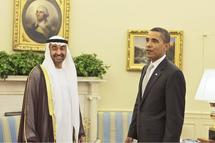
When it announced the meeting would take place last week, the White House said that the talks would focus on the "strong ties between the United States and the United Arab Emirates and our common strategic interests in the region."
The UAE, a key US strategic and export partner, and Qatar were the only Arab states to send warplanes for operations over Libya, where strongman Moamer Kadhafi's forces are battling Western-backed rebels.
The emir of Qatar was also granted a meeting with Obama in the Oval Office this month.
Obama has been discussing the turmoil throughout the Middle East and the Arab world -- a dominant US foreign policy interest -- in all his recent talks and telephone calls with regional leaders.
Washington was concerned when tense relations between Gulf Arab states and Iran were exacerbated after the mid-March intervention of Gulf security forces, including a contingent from the UAE, in Sunni-ruled Bahrain where security forces crushed a Shiite-led pro-democracy uprising.
The intervention sparked a war of words between various Gulf Arab states and their neighbor Iran, a long-time foe of the United States.
Tuesday's meeting also took place as the United States mulls targeted sanctions against Syria after a crackdown by the Baathist government in Damascus on opposition protestors.
According to the State Department, the UAE is the single largest US export market in the Middle East and hosts more American naval ships than any port outside the United States.
--------------------------------------------------------------------------------
The UAE, a key US strategic and export partner, and Qatar were the only Arab states to send warplanes for operations over Libya, where strongman Moamer Kadhafi's forces are battling Western-backed rebels.
The emir of Qatar was also granted a meeting with Obama in the Oval Office this month.
Obama has been discussing the turmoil throughout the Middle East and the Arab world -- a dominant US foreign policy interest -- in all his recent talks and telephone calls with regional leaders.
Washington was concerned when tense relations between Gulf Arab states and Iran were exacerbated after the mid-March intervention of Gulf security forces, including a contingent from the UAE, in Sunni-ruled Bahrain where security forces crushed a Shiite-led pro-democracy uprising.
The intervention sparked a war of words between various Gulf Arab states and their neighbor Iran, a long-time foe of the United States.
Tuesday's meeting also took place as the United States mulls targeted sanctions against Syria after a crackdown by the Baathist government in Damascus on opposition protestors.
According to the State Department, the UAE is the single largest US export market in the Middle East and hosts more American naval ships than any port outside the United States.
--------------------------------------------------------------------------------









 Home
Home Politics
Politics









